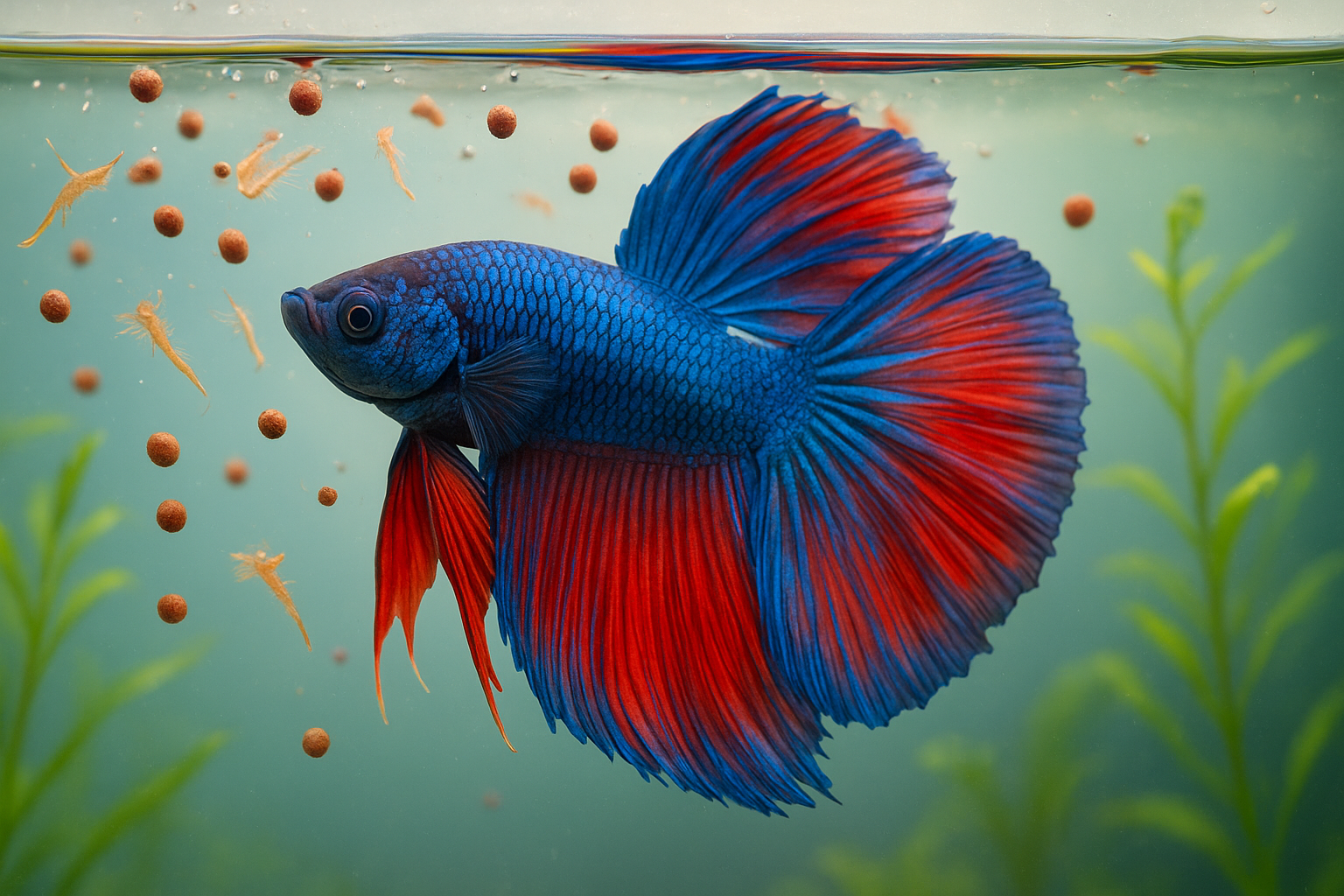One of the first things you’ll want to know if you have a betta fish is what they eat. Giving them the right food is very important for their colour, energy, and long life. Betta fish are beautiful and full of life, but what they eat has a big effect on their health. We’ll talk about everything you need to know about betta fish food in this article, including what they eat, how much they eat, how often they eat, and what you should avoid. This will help you become a responsible and caring betta owner.
Learning About What Betta Fish Eat in the Wild
To really understand what betta fish eat, you should watch how they act in the wild. In their natural habitat, bettas live in shallow rice paddies and ponds in Southeast Asia. They eat small bugs, larvae, worms, and even crustaceans there. This means that bettas eat meat by nature, not plants or algae. They need foods that are high in protein.
Bettas need a diet that is similar to this natural protein-based diet when they are pets. Giving them food made for herbivorous or omnivorous fish can make them sick, cause them to swell up, or lose their colour. If you know what betta fish eat in the wild, you can make better food choices for them at home.
What Betta Fish Should Eat Every Day?
To keep your Betta healthy, it needs to eat a balanced diet every day. Betta pellets that are made just for them should be their main source of food. These pellets have a lot of protein, vitamins, and minerals in them that help them grow and stay colourful.
People like pellets better than flakes because they are easier to measure and make less waste. Make sure the pellets you choose sink slowly and are labelled just for bettas. This makes sure that your fish gets food that is the right size for its mouth and the right speed for its digestion.
Bloodworms, daphnia, and brine shrimp that have been frozen or freeze dried can also be part of the regular diet. These foods are like what bettas would eat in the wild, which makes feeding time more fun. To keep your pet from getting bored and missing out on important nutrients, switch these treats with pellets.
How Much and How Often to Feed Your Betta?
Overfeeding is a common mistake that new betta owners make. Bettas don’t need a lot of food because their stomachs are only about the size of their eyes. Give your Betta two small meals a day, one in the morning and one at night.
You should only give your fish a few pellets or a small pinch of food at each meal. They should be able to finish it in two minutes. You should get rid of leftover food right away to keep the water clean. A betta can live without food for short periods of time, so it’s better to feed it a little less than too much. When you feed your fish too much, they can get bloated, have problems with their swim bladder, and their tanks can get dirty, which makes the water quality worse.
Different Foods for Betta Fish
Bettas like and benefit from a variety of foods, even though pellets are their main food. Your fish will be healthier and more active if they eat a variety of foods. You can give your fish frozen or live treats like bloodworms, mosquito larvae, and brine shrimp. These are great sources of protein and taste like what betta fish eat in the wild.
But you need to be careful. If you give your fish too many live or frozen treats, they may become picky and get constipated. You should only give treats two or three times a week and in small amounts. This balance makes sure your Betta receives the nutrients it needs without putting too much stress on its digestive system.
Things You Shouldn’t Feed Betta Fish
To know what betta fish should eat, you also need to know what they shouldn’t eat. Don’t give bettas regular tropical fish flakes or goldfish food because they have too many plant-based ingredients.
Please do not give them bread, crackers, or other human snacks; these can make their stomachs swell and hurt them. Fatty or processed meats are also not safe. Bettas also don’t digest fibrous vegetables well, so a small piece of cooked pea can help with constipation once in a while, but it should never take the place of their protein diet.
Watching how your Betta eats
You can learn a lot about your Betta’s health by watching it eat. A healthy betta will swim quickly to food and eat it right away. If your fish won’t eat, spits out food, or seems sluggish, the water quality, the type of food, or the stress levels may be too high.
Bettas won’t eat new food right away because they need time to get used to it. Be patient and stick with the same brand of food for a few days before switching. Check the temperature and quality of the water if your fish hasn’t eaten in a few days. Bad conditions can make fish less hungry.
Changes in feeding based on the season and age
The food that betta fish eat can change a little bit based on how old they are and where they live. For younger bettas to grow, they need to eat smaller meals more often that are high in protein. On the other hand, adult bettas stay full of energy by eating two moderate meals a day. To keep older bettas or bettas that aren’t very active from getting too big, give them smaller portions.
When it gets colder outside, your Betta’s metabolism may slow down if the temperature in your home drops. If this happens, cut back on feeding a little bit because food that isn’t eaten will pollute the water.
Fasting and Taking Care of Your Digestive System
Bettas do better when they don’t eat for a while. Skip feeding them once a week for a day so their digestive systems can clear out. This keeps your fish healthy and active by keeping them from getting constipated or bloated. If your Betta is bloated, you can give it a small piece of cooked, peeled pea the next day to help it digest, but this is only a temporary fix.
Making a Schedule for Feeding
Your Betta will feel safe if you feed them at the same time every day. Every day, feed at the same time in a calm place. Don’t tap on the tank or make sudden movements while feeding your fish, as this can make them refuse to eat.
Please keep track of what you feed your fish, how much, and how they react. Change it based on how much energy you have and how much waste is in the tank. If you feed your Betta the right way, it will live a long, happy life full of colour and energy.
FAQs
Q1: What kind of food should I give my betta fish every day?
A high-protein pellet made just for bettas is the best food for them every day. You can also add frozen or freeze-dried bloodworms or brine shrimp to the mix a few times a week.
Q2: Is it okay for betta fish to eat food that people eat?
It’s okay for bettas to eat small amounts of cooked shrimp or peas from time to time, but they should never eat human food instead of their main diet. Never eat anything salty, oily, or has spices on it.
Q3: How many times a day should I give my Betta fish food?
In the morning and at night, give your betta food that it can eat in two minutes.
Q4: Why isn’t my Betta eating?
Your Betta might be stressed, the water might be too cold, or it might not like the new food. Try to keep the water conditions the same and give them fresh, high-protein food.
Q5: Is it okay for betta fish to eat flakes instead of pellets?
You can use flakes sometimes, but pellets are better. They sink more slowly and have the right nutrients for the kinds of food that betta fish eat in the wild.
In conclusion
To feed your betta fish the right way, you need to find a balance, give them a variety of foods, and know what they really need. Bettas are carnivores, so they do best on diets high in protein. Give them good pellets as their main food, mix in frozen treats now and then, and don’t give them too much food or too many plants.
You can make sure your Betta lives a long, healthy, and active life by learning what they eat and sticking to a regular schedule. Take a few minutes today to look over your fish’s diet and feeding schedule. Your Betta’s health and happiness depend on it.


